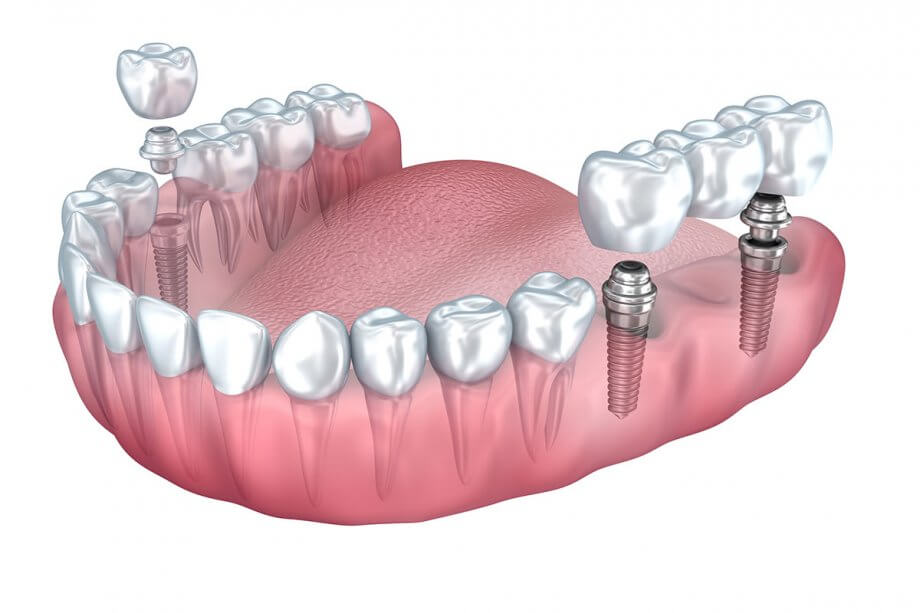If you need to replace a tooth, your dentist might offer you a choice between a dental implant and a dental bridge. Both procedures have their own pros and cons, so it is very important to fully understand both options in order to make the best decision for your unique needs and goals.
What Is a Dental Implant?
A dental implant is a sliver of biocompatible titanium that is surgically placed in the jawbone and allowed to heal. Over the next three to six months, the implant will fuse with the jawbone, creating a strong and stable base for a highly realistic crown. You will wear a temporary crown during this fusion process unless you receive an immediate-load implant.
Advantages of Dental Implants
Dental implants have several advantages, including:
Virtually maintenance-free: Dental implants can last a lifetime with proper care. Be scrupulous about your oral hygiene and see your dentist twice per year, and you should have no problems with your dental implant.
Natural look and function: Dental implants are strong and stable. They look, function, and feel just like natural teeth.
Jawbone health: A hole in your mouth where a tooth is missing can put you at risk for jawbone deterioration. Dental implants preserve the jawbone.
Preserving adjacent teeth: A dental implant stands alone rather than relying on the adjacent teeth like a dental bridge.
Disadvantages of Dental Implants
Of course, dental implants also have their own drawbacks, such as:
Surgery: Although it is considered minor, dental implant placement is a form of oral surgery. There are always minimal risks with any surgery, such as infection and nerve damage.
Time: Bone heals slowly, so unless you have an immediate-load implant placed, you will need to wait 3 to 6 months to receive your final restoration.
Not Always Appropriate: Implants cannot be placed if the patient is severely medically compromised.
What Is a Dental Bridge?
As the name suggest, a dental bridge bridges the gap when one or more teeth in a row are missing. Dental bridges are anchored to the natural teeth on either end, supporting one or more replacement teeth in between. A traditional bridge is secured by crowns on the natural teeth, while a Maryland bridge is bonded to the backs of the teeth.
Advantages of Dental Bridges:
Dental bridges have several advantages of which you should be aware:
Simplicity: A dental bridge does not require oral surgery. Preparing the teeth and placing the teeth is quite simple and easy.
Speed: A dental bridge typically takes two appointments to complete. First, your natural teeth are prepared and impressions are taken. Then, when your new bridge is ready (typically a few days later), the bridge is bonded to your teeth.
Affordability: Dental bridges are strong and secure, and they typically cost less than implants.
Disadvantages of Dental Bridges:
Of course, dental bridges also have their own drawbacks:
Less Aesthetic: Although dental bridges can look quite natural, they still connect the teeth to each other. A dental implant is separate from the other teeth, creating a more aesthetic appearance.
Periodic Replacement: Dental bridges typically need to be replaced every 5 to 10 years.
Adjacent Tooth Damage: To prepare the adjacent teeth to accept the bridge, we must remove a fair amount of healthy tooth structure. This could put those teeth at increased risk for decay or even fracture.
Which Should You Choose?
Both dental implants and dental bridges have significant advantages and significant drawbacks. There is no one-size-fits-all answer to which option is the best. Have a long talk with your dentist, taking into consideration your budget, your goals for treatment, and even how long you are willing to wait to replace the tooth. Your dentist will help you decide which is right for you.
Ready to Get Started?
If you are ready to start your journey toward better dental health, contact A&R Advanced Dental Group today at 845-364-9400 (Pomona) or 718-376-1666 (Brooklyn) to schedule your first appointment.

